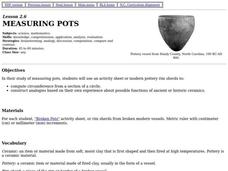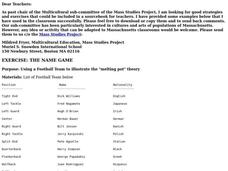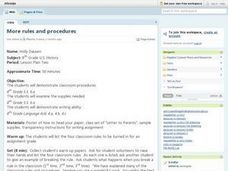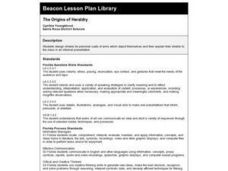Curated OER
Inference By Analogy
Students infer the use or meaning of items recovered from a North Carolina Native American site based on 17th-century European settlers' accounts and illustration.
Curated OER
How Big is Big?
Geography learners compare and contrast population densities throughout the world. Using maps, they estimate the relative size of the world's regions and populations. They develop analogies to discover the world they live in and...
National Endowment for the Humanities
Factory vs. Plantation in the North and South
North is to factory as South is to plantation—the perfect analogy for the economy that set up the Civil War! The first lesson in a series of five helps teach beginners why the economy creates a driving force for conflict. Analysis of...
Curated OER
The Talking Goat
Young scholars read and analyze an African folktale. They read and discuss the folktale, analyze a map of Africa and Liberia, complete a worksheet, answer discussion questions, and analyze the patterns and analogies of the folktale.
Curated OER
Measuring Pots
Students use an activity sheet to construct analogies about possible function of ancient or historic ceramics and compute circumference from a section of a circle as they study measuring pots.
National Woman's History Museum
Tea with Penelope: A 2-Point Perspective of the Edenton Tea Party
A brief introduction to Penelope Barker sets the stage for a discussion about political cartoons and the persuasive technique used to create them. A graphic organizer aids scholars in the analysis of a piece of work using a 2-point...
Curated OER
I Have a Metaphor
Learners locate the literary devices used in Martin Luther King Jr.'s "I Have a Dream" speech. In this figurative language lesson plan, students first distinguish between similes, metaphors, analogies, personification, etc. Learners...
Curated OER
Comparing Edible Communities
Students explore the components of a community by creating analogies between aspects of a community and ingredients within a recipe. They view and discuss pictures, write analogies, and generate a product from a recipe.
Curated OER
The Name Game
Students participate in a variety of activities that promote multicultural diversity. They examine the names on a professional football team roster and make the analogy of the make-up of the team to the make-up of America. They create...
Curated OER
More Rules and Procedures
Students investigate classroom rules, procedures and expectations given by the teacher. They discuss the analogy of needing ingredients and supplies to bake a pie and needing ingredients and supplies to do their school work. Throughout...
Curated OER
Identifying Structured Patterns in Folk Tales
Middle schoolers are introduced to the structure of folk tales. After working through an example, they identify as many folk tales as possible that follow the same pattern. In groups, they compare a folk tale and a fairy tale to...
Curated OER
Quotations of Martin Luther King, Jr.
In this quotations activity, students read and analyze 7 quotations by Martin Luther King, Jr. Students match each quote to the correct interpretation.
Curated OER
I, Robot: Chapter Four- Catch That Rabbit
Sixth graders explore the development of technology in the 20th century. For this chapter lesson, 6th graders read and discuss the literary content of chapter four, I, Robot by Isaac Asimov. They research the technology that was found...
Curated OER
Sexual Exploitation
Learners analyze psychology by completing a true or false worksheet. In this sexual health activity, students read assigned text which dictates when it is or isn't appropriate to touch a person and what to do if you feel uncomfortable in...
Curated OER
Personality Development
Students participate in a variety of activities to help them define their own personalities. They complete questionnaires, play personality Bingo, and compare kaleidoscopes and candy to the variety found in humans.
Curated OER
The Finish Line
Young scholars investigate the philanthropy of various cultural traditions. In this cultural education lesson plan, students read a handout about Native American, European American, and African American traditions and identify the...
Curated OER
Benedict Arnold: A Question of Honor
Students watch the movie, Benedict Arnold: A Question of Honor, and participate in post-viewing activities to model their understanding of the movie.
Curated OER
The Origins of Heraldry
Students design a personal coat of arms which depicts themselves and explain their shields to the class in an informal presentation.
Curated OER
The Roots of Our Rights
Students examine the Preamble to the Constitution. In this government lesson, students read the Preamble of the Constitution and define the meaning of unknown words. Students write about examples of how the Constitution protects our rights.
Curated OER
Plants -- What Are Their Parts and Functions?
Students identify the parts of a flowering plant and their functions. They describe its life cycle as well. They compare the parts of the plant to the roles that are needed in a democracy.
Curated OER
History: Fact of Fiction?
Students find a historial novel online and distinguish between fiction and nonfiction books. They research three historical events related to their novel and write a letter to a figure from their novel's time period.
Other popular searches
- Analogy Worksheets
- Cell City Analogy
- Cell Organelle Analogy
- Cell Analogy
- 6th Grade Analogy Worksheets
- Dna and Rna Analogy
- Analogy Worksheets 7 8
- Cell Transport Analogy
- Word Analogy
- Active Transport Analogy
- Synonym and Antonym Analogy
- Analogy Worksheets 5 6






